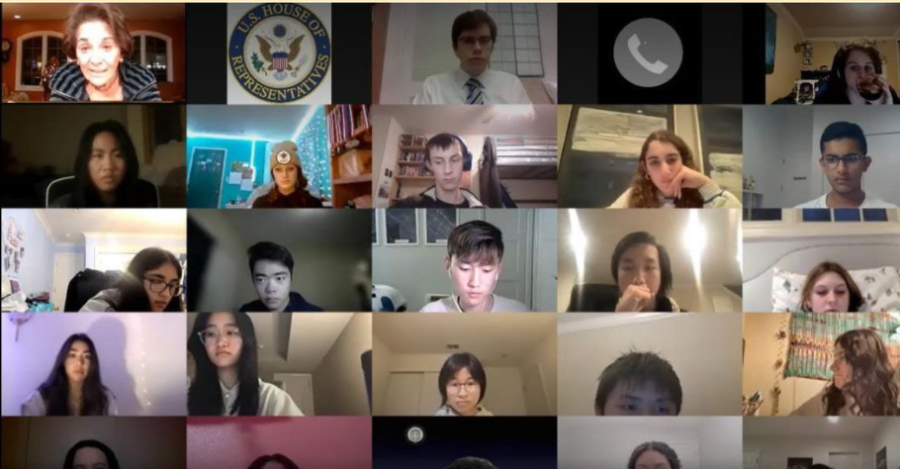Voices Without a Vote
Students find political outlet serving on Rep. Anna Eshoo’s Student Advisory Board
The student advisory board meets with Congresswoman Anna Eshoo on December 15, 2021. Photo by Ethan Boneh.
Healthcare inequality.
Maternal mortality.
Prison reform.
These are just some of the enduring, multifaceted issues the next generation of leaders is confronting on Congresswoman Anna Eshoo’s Student Advisory Board. Several Palo Alto High School students serve on Eshoo’s board. Eshoo represents the 18th Congressional district, encompassing Palo Alto and much of the South Bay.
The board was founded in 1993 and is intended “to give young people a voice in our government,” according to Eshoo’s website. It consists of 180 high school students who research specific policy areas and present recommendations to Eshoo.
The board meets twice a month via Zoom and is split into committees that research specific topics. Although this session of the board is currently in the research stage, Eshoo has taken recommendations from students and presented them to the House of Representatives in the past, junior Ethan Boneh said.
Boneh, chair of the board’s public health committee, said his committee is currently focusing on maternal health.
“We started out addressing gender discrepancies in the healthcare system because our focus is overall public health,” Boneh said. “But then gradually narrowed that into maternal health because it’s an issue that we can probably have an impact in and it’s also a very serious issue in this country.”
Chairing the public health committee has been one of the most meaningful parts of Boneh’s time on the board.
“I lead a team of 90 people, and so I had to learn to network with people,” Boneh said. “But it’s also very rewarding because I get to talk to each of the individual subcommittees and strategize with them about how they’re going to mesh with the overall goal of the board.”
Overall, Boneh said seeing his work have an impact is the most rewarding aspect of serving on the board.
“The fact that we can have people presenting unique and diverse perspectives for the congresswoman to actually pitch to Congress to potentially create a change is something very inspiring to me,” Boneh said.
Junior Kieran Zajac, who is researching prison reform, also said serving on the board has been an informative way to learn more about how politics works.
“You get to learn how her administration works, what kinds of things she proposes, what gets passed,” Zajac said.
U.S. Government teacher Caitlin Drewes said she finds students who are involved in politics gain experience engaging with different views.
“I think it [working in politics] makes students listen better and hear different perspectives and understand that those perspectives are valid, even if you don’t agree with them,” Drewes said.
Boneh said the board offers the opportunity to participate in politics and engage in this type of discussion.
“You learn a lot, you know, you get to have a real impact,” Boneh said. “And you get to work with amazing people who are just as interested as you are in making real change and that’s something you can’t replace.”
